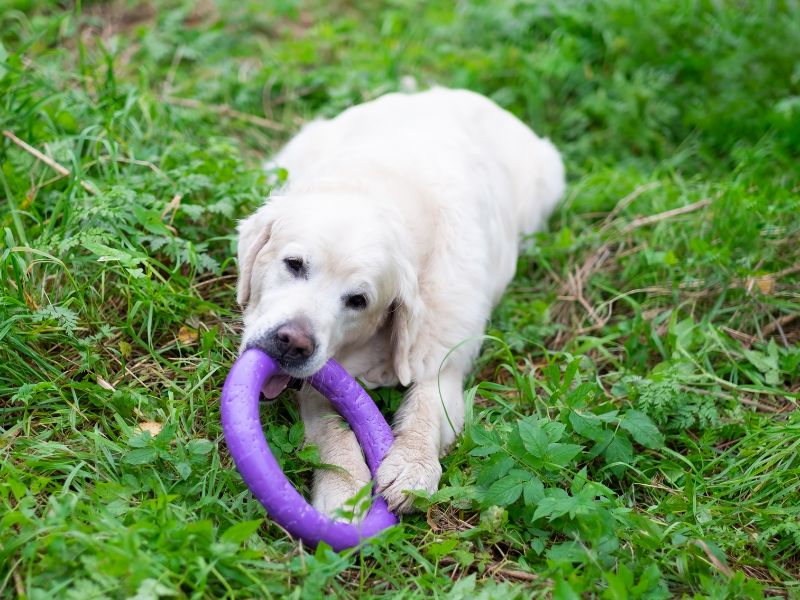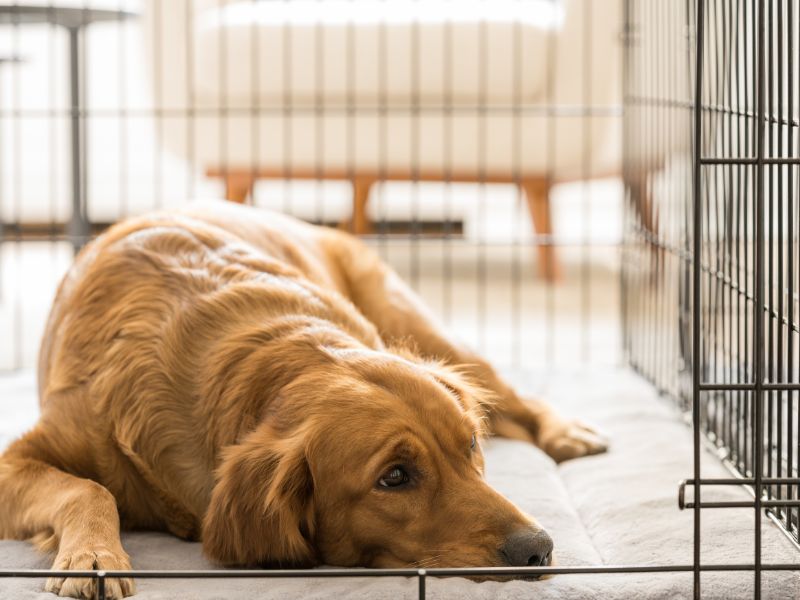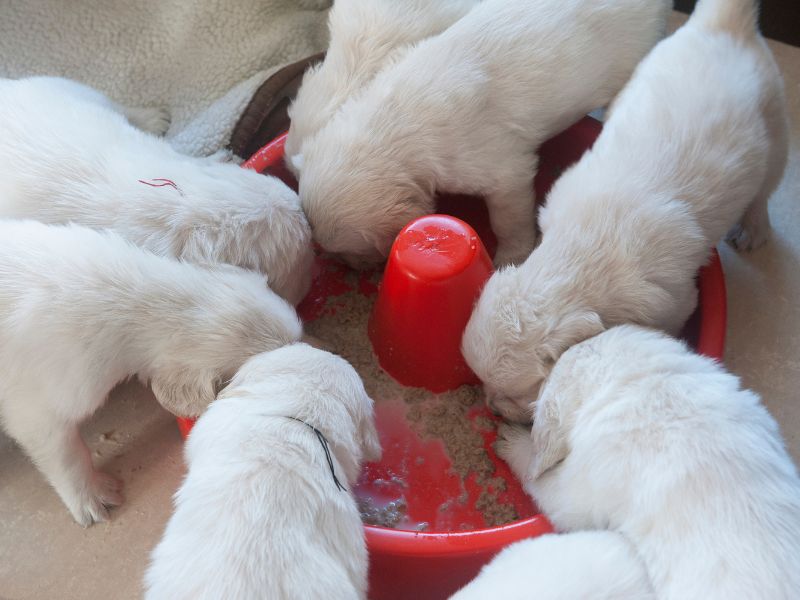Puppy crying can be a frustrating experience for new pet owners. It’s not uncommon for puppies to cry or whine during their first few nights in a new home. However, excessive crying can be a sign of an underlying issue, such as separation anxiety, fear, or discomfort.
To stop puppy crying, it’s important to first identify the cause. Puppies may cry because they need to go potty, are hungry, thirsty, or tired. Ensuring that their basic needs are met can help reduce crying. Creating a routine and sticking to it can also help puppies feel more secure and reduce their anxiety.
If the puppy’s crying persists, there are several techniques that can be used to help soothe them. These include providing a comfortable sleeping area, using a crate, providing toys and treats, and using calming scents. It’s important to be patient and consistent when trying to stop puppy crying, as it may take some time for the puppy to adjust to their new environment.
How To Get Your Puppy To Stop Crying
Puppies are adorable, but their crying can be frustrating and stressful for their owners. Here are some tips to help your puppy stop crying:
- Establish a routine: Puppies thrive on routine, so establish a consistent schedule for feeding, potty breaks, and playtime. Stick to this schedule as much as possible to help your puppy feel secure and comfortable.
- Provide comfort: Puppies often cry because they feel scared or lonely. Provide your puppy with a comfortable bed, toys, and a blanket with your scent on it to help them feel safe and secure.
- Avoid punishment: Punishing your puppy for crying can make the problem worse. Instead, try to understand why your puppy is crying and address the underlying issue.
- Teach basic commands: Teaching your puppy basic commands like “sit” and “stay” can help them feel more secure and confident. This can also help you redirect their attention when they start crying.
- Consider crate training: Crate training can help your puppy feel safe and secure, as long as it’s done correctly. Gradually introduce your puppy to the crate and make it a positive experience with treats and praise.
Remember, puppies cry for a reason, so try to understand why your puppy is crying and address the underlying issue. With patience and consistency, you can help your puppy stop crying and become a happy, well-adjusted member of your family.
My Puppy Won’t Stop Crying In The Crate
Puppies are adorable, but their crying can be distressing, especially when they won’t stop crying in their crate. It’s important to understand that crying is a natural behavior for puppies, and it’s their way of communicating with their owners. However, excessive crying can be a sign of discomfort, anxiety, or boredom, and it’s essential to address the issue to ensure your puppy’s well-being.
One of the most common reasons why puppies cry in their crate is separation anxiety. Puppies are social animals and crave companionship, so being alone in a crate can be stressful for them. To help your puppy feel more comfortable in their crate, consider placing their crate in a central location in the house where they can see and hear you. You can also leave a piece of clothing with your scent in the crate to provide comfort and reassurance.
Another reason why puppies cry in their crate is boredom. Puppies have a lot of energy and need plenty of mental and physical stimulation to keep them occupied. To prevent boredom, make sure your puppy has plenty of toys and chews to play with in their crate. You can also rotate their toys to keep them interested and engaged.
It’s also important to ensure that your puppy’s crate is the right size. A crate that is too small can be uncomfortable and make your puppy feel trapped, while a crate that is too big can give your puppy too much space to move around and potentially use one end as a bathroom. A good rule of thumb is to get a crate that is big enough for your puppy to stand up, turn around, and lie down comfortably.
By addressing the underlying cause of your puppy’s crying and providing them with comfort, stimulation, and a comfortable crate, you can help your puppy feel more secure and content in their crate. Remember to be patient and consistent, and seek professional advice if your puppy’s crying persists.
Is Your Puppy Crying Because She’s Scared or Lonely?
Puppies are known to cry or whine when they feel scared or alone after being separated from their mother and littermates and are in a new environment, such as when the pet parent first brings the puppy home. Once puppies have formed an attachment to their pet parents and other family members, they also may cry and whine when they are separated from them.
Solution
If your puppy is crying because she’s scared or lonely, there are a few things you can do to help her feel more comfortable:
- Create a comfortable and safe space for your puppy. Provide a cozy bed, blankets, and toys to make her feel more secure. You can also use a crate to give her a sense of security and comfort.
- Spend time with your puppy. Make sure to give your puppy plenty of attention and affection. Play with her, take her for walks, and give her lots of cuddles.
- Introduce your puppy to new people and places. Socializing your puppy can help her feel more comfortable in new situations. Take her to new places, introduce her to new people and animals, and expose her to different sounds and smells.
- Consider getting another pet. If your puppy is feeling lonely, consider getting another pet to keep her company. A second dog or cat can provide a great companion for your puppy and help her feel less lonely.
By following these tips, you can help your puppy feel more comfortable and secure, and reduce her crying and whining.
Is Your Puppy Crying Because She’s Not Tired?
Puppies have a lot of energy, and if they don’t get enough exercise, they can become restless and bored. This can lead to excessive crying and whining, especially at night when they should be sleeping. If your puppy is crying and you’ve ruled out other causes like hunger, thirst, or needing to go outside, it’s possible that she’s just not tired enough.
Solution
The solution to this problem is simple: make sure your puppy gets enough exercise during the day. This will help her burn off excess energy and tire her out so she’s ready to sleep at night. Here are some tips to help you tire out your puppy:
- Take your puppy for a walk or run in the morning and evening.
- Play fetch or tug-of-war with your puppy.
- Teach your puppy new tricks or obedience commands.
- Use puzzle toys or treat-dispensing toys to keep your puppy mentally stimulated.
- Consider enrolling your puppy in a puppy socialization class where she can play with other puppies and get additional exercise.
By providing your puppy with enough exercise and mental stimulation, you can help prevent excessive crying and ensure that she gets the rest she needs to be happy and healthy.
Is Your Puppy Crying Because He’s Uncomfortable?
Puppies may cry when they’re uncomfortable. Here are some reasons why your puppy may be uncomfortable and some solutions to help them feel better.
Solution
If your puppy is crying because he’s uncomfortable, there are a few things you can do to help him feel better.
- Check the temperature: Puppies are sensitive to temperature changes. Make sure the room is not too hot or too cold. If it’s too hot, turn on a fan or air conditioner. If it’s too cold, add a blanket or turn up the heat.
- Check the bedding: Make sure your puppy has a comfortable place to sleep. If the bedding is too hard or uncomfortable, your puppy may cry. Consider getting a soft bed or adding a blanket.
- Check for fleas or ticks: If your puppy is uncomfortable due to fleas or ticks, they may cry. Check your puppy’s fur for any signs of fleas or ticks and treat accordingly.
- Check for injuries: If your puppy is uncomfortable due to an injury, they may cry. Check your puppy’s body for any signs of injury and take them to the vet if necessary.
- Check for digestive issues: If your puppy is uncomfortable due to digestive issues, they may cry. Make sure your puppy is eating a healthy diet and has access to plenty of water.
By addressing your puppy’s discomfort, you can help them feel better and stop their crying.
Is Your Puppy Crying Because She Needs To Potty?
Puppies have small bladders and need to go potty frequently. If your puppy is crying, it could be a sign that she needs to go outside. Here are some signs that your puppy needs to potty:
- Sniffing around
- Circling around
- Whining or crying
- Scratching at the door
If you notice any of these signs, take your puppy outside immediately.
Solution
To avoid crying that is caused by needing to use the bathroom, place your puppy on a routine potty schedule. Take your puppy outside first thing in the morning, after meals, before bedtime, and every few hours in between.
If your puppy is still crying in her crate, it may be a sign that she needs to go potty in the middle of the night. Set an alarm and take her outside to potty. Gradually increase the time between potty breaks as your puppy gets older and can hold it for longer periods of time.
Remember, never punish your puppy for having an accident inside. Instead, reward her for going potty outside with treats and praise. This will encourage her to continue going potty outside and reduce the amount of crying caused by needing to go potty.
Is Your Puppy Crying Because He’s Bored?
Puppies are full of energy and need lots of stimulation to keep them happy and healthy. When they don’t get enough exercise or mental stimulation, they can become bored and start to cry. If you suspect that your puppy is crying because he’s bored, there are a few things you can do to help.
Solution
The following are some solutions to help prevent your puppy from crying due to boredom:
- Provide plenty of exercise: Puppies need lots of exercise to burn off their energy. Take your puppy for a walk or run around the backyard to help him expend his energy.
- Provide mental stimulation: Puzzles, treat-dispensing toys, and interactive games can help keep your puppy’s brain active and engaged.
- Teach new tricks: Teaching your puppy new tricks can be a fun way to stimulate his mind and prevent boredom.
- Rotate toys: Keep a variety of toys on hand and rotate them regularly to prevent your puppy from getting bored with the same toys.
- Create a safe space: Puppies need a safe space to relax and unwind. Create a comfortable space for your puppy with a comfortable bed, toys, and water.
By providing your puppy with plenty of exercise, mental stimulation, and a safe space to relax, you can help prevent him from crying due to boredom. If your puppy continues to cry, it’s important to rule out any other underlying issues such as hunger, pain, or illness.
Is Your Puppy Crying Because He’s Hurt?
If your puppy is crying excessively and you have ruled out all other possible reasons, it’s possible that he’s in pain or discomfort. Puppies are curious creatures and can get into all sorts of trouble, leading to injuries or illnesses. Here are some signs that your puppy may be hurt:
- Limping or favoring one leg
- Refusing to put weight on a particular limb
- Yelping or crying when touched in a particular area
- Swollen or tender body parts
- Changes in appetite or water intake
- Vomiting or diarrhea
If you suspect that your puppy is hurt, it’s important to take him to the vet as soon as possible. Delaying treatment could make the injury worse and lead to complications.
Solution
If your puppy is hurt, the best thing you can do is get him to the vet. The vet will be able to diagnose the problem and recommend a course of action. Depending on the severity of the injury, your puppy may need medication, surgery, or other treatments.
In the meantime, you can help your puppy feel more comfortable by providing a warm and quiet place to rest. Make sure he has access to water and food, but don’t force him to eat if he doesn’t want to. You can also use a warm compress or ice pack (depending on the injury) to help reduce swelling and pain.
Remember, puppies are resilient creatures, and with proper care and treatment, your furry friend will be back to his happy, playful self in no time.
Is Your Puppy Crying Because She’s Sick?
If your puppy is crying excessively, it could be a sign that she’s not feeling well. Some of the most common reasons why a puppy might cry when she’s sick include:
- Pain or discomfort: If your puppy is crying and seems to be in pain, it’s possible that she’s experiencing some kind of discomfort. This could be due to a range of issues, from a minor injury to a more serious health problem.
- Digestive issues: Puppies are known for having sensitive stomachs, and if your puppy is crying and experiencing diarrhea or vomiting, it could be a sign of a digestive issue.
- Respiratory problems: If your puppy is crying and also seems to be having trouble breathing, it could be a sign of a respiratory problem. This could be due to an infection or other respiratory issue.
- Other health problems: There are many other health problems that could cause your puppy to cry, including infections, allergies, and more.
Solution
If you suspect that your puppy is crying because she’s sick, it’s important to take her to the vet as soon as possible. Your vet will be able to examine your puppy and determine the underlying cause of her symptoms. Depending on the diagnosis, your vet may recommend medication, dietary changes, or other treatments to help your puppy feel better.
In the meantime, there are a few things you can do to help soothe your puppy and make her more comfortable. Make sure she has a comfortable place to rest, and try to keep her calm and relaxed. You can also offer her small amounts of water and food, but be sure to follow your vet’s instructions regarding what to feed her. Finally, be sure to monitor your puppy’s symptoms closely and contact your vet if they worsen or if you have any concerns.
Is Your Puppy Crying Because She’s Hungry?
Puppies have small stomachs and high metabolisms, which means they need to eat more frequently than adult dogs. If your puppy is crying, it may be because she’s hungry. Here are some signs that your puppy may be crying because she’s hungry:
- She’s crying shortly after eating
- She’s crying at regular meal times
- She’s crying more frequently than usual
Solution
If your puppy is crying because she’s hungry, the solution is simple: feed her! Here are some tips to ensure that your puppy is getting the right amount of food:
- Follow the feeding guidelines on the puppy food package
- Divide your puppy’s daily food allowance into several small meals throughout the day
- Make sure your puppy has access to fresh water at all times
It’s important not to overfeed your puppy, as this can lead to obesity and other health problems. If you’re unsure about how much to feed your puppy, consult with your veterinarian.
Remember, feeding your puppy is not only important for her physical health, but also for her emotional well-being. A hungry puppy is more likely to be anxious, restless, and irritable. By ensuring that your puppy is well-fed, you can help her feel calm, content, and happy.
Is Your Puppy Crying Because She Wants Attention?

If your puppy is crying, it could be because she wants attention. Puppies are social animals and crave attention from their owners. However, it’s important to distinguish between legitimate needs and attention-seeking behavior.
Warning
If you give your puppy attention every time she cries, you may be inadvertently reinforcing the behavior. This can lead to a cycle of crying for attention and getting attention, which can be difficult to break. Additionally, if your puppy is crying because she needs something else, such as food or a potty break, giving her attention will not solve the problem.
Solution
To determine if your puppy is crying for attention, first make sure her basic needs are met. Take her outside for a potty break, make sure she has food and water, and provide her with appropriate toys to play with. If she continues to cry, try ignoring her for short periods of time. When she stops crying, reward her with attention or a treat. This will help teach her that quiet behavior is rewarded, while crying for attention is not.
It’s also important to provide your puppy with plenty of positive attention throughout the day. Spend time playing with her, going for walks, and training her. This will help fulfill her social needs and reduce the likelihood of attention-seeking behavior.
In summary, if your puppy is crying for attention, it’s important to distinguish between legitimate needs and attention-seeking behavior. Make sure her basic needs are met and try ignoring her for short periods of time. Provide her with plenty of positive attention throughout the day to fulfill her social needs and reduce the likelihood of attention-seeking behavior.
Conclusion
In conclusion, stopping a puppy from crying requires patience, understanding, and consistency. It is important to identify the root cause of the crying, whether it is due to separation anxiety, discomfort, boredom, or hunger. Once the cause has been identified, implementing strategies to address it can help ease the puppy’s distress and speed up the process of stopping the crying.
Some key tips to consider include creating a comfortable and safe space for the puppy, providing plenty of toys and activities to keep them occupied, establishing a routine for feeding and potty breaks, and avoiding positively reinforcing crying behavior. It is also important to remember that puppies are still learning and adjusting to their new surroundings, so it is important to remain calm and patient throughout the process.
By implementing these strategies and remaining consistent, owners can help their puppies adjust and stop crying. With time and patience, puppies can learn to feel comfortable and secure in their new homes.















